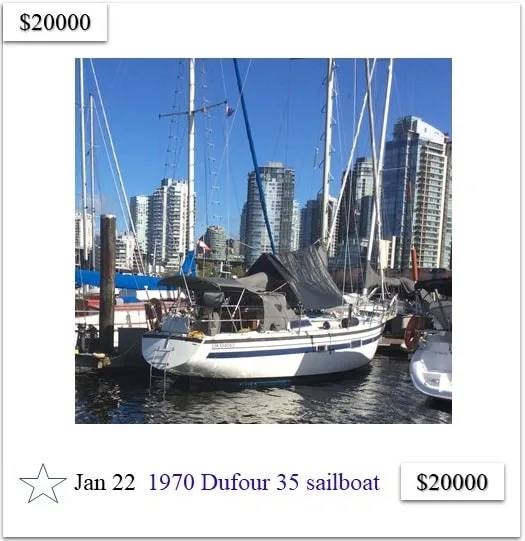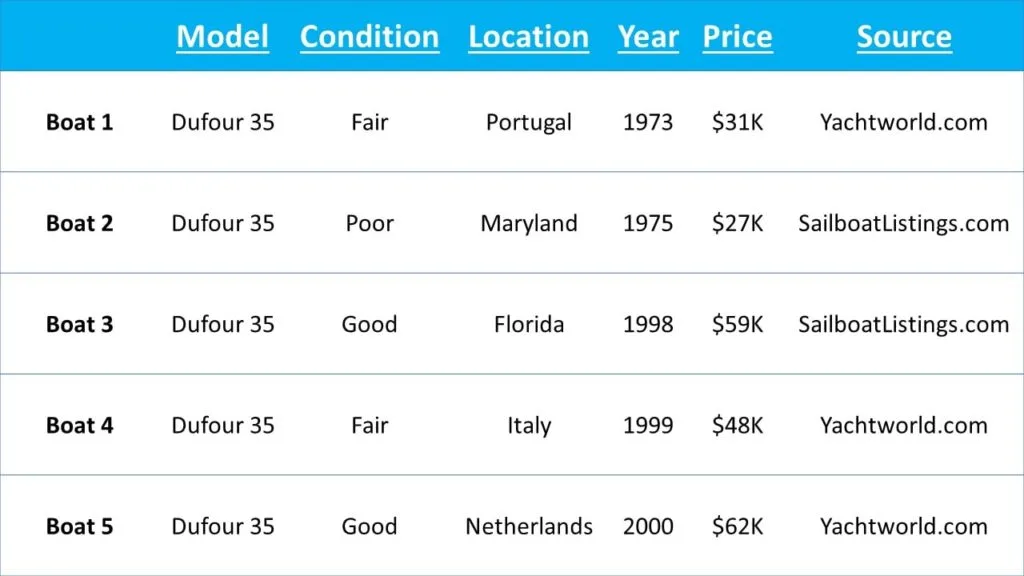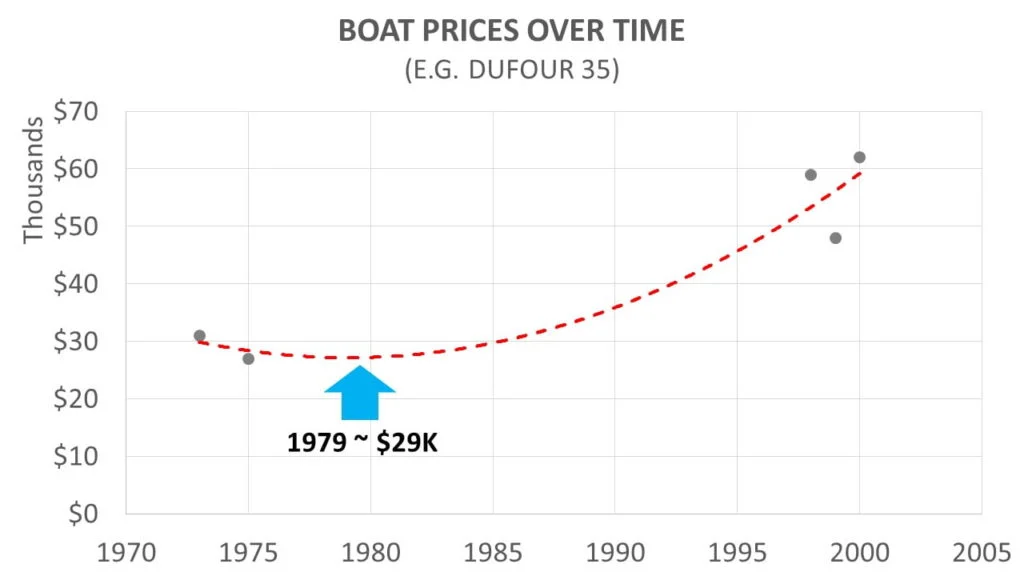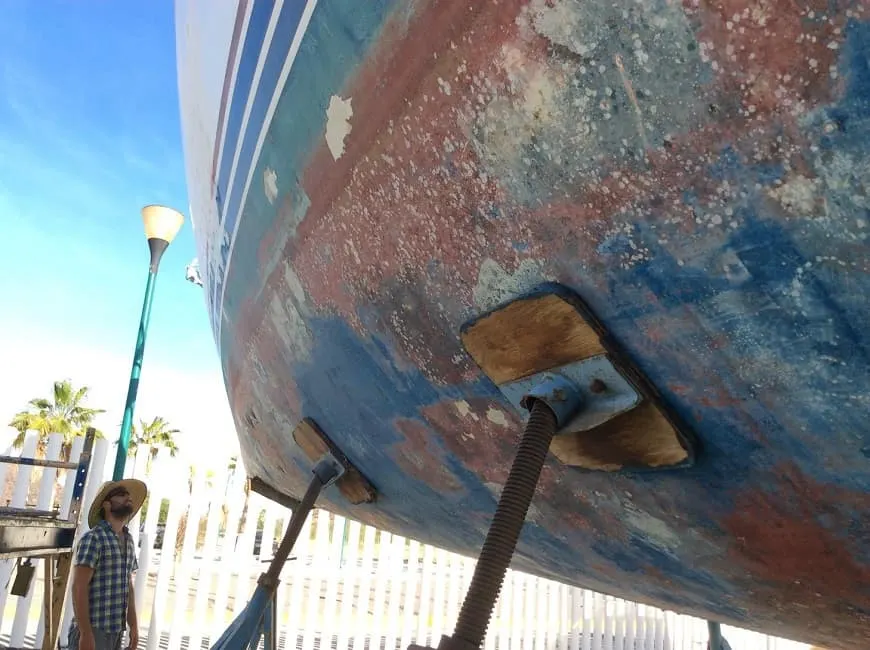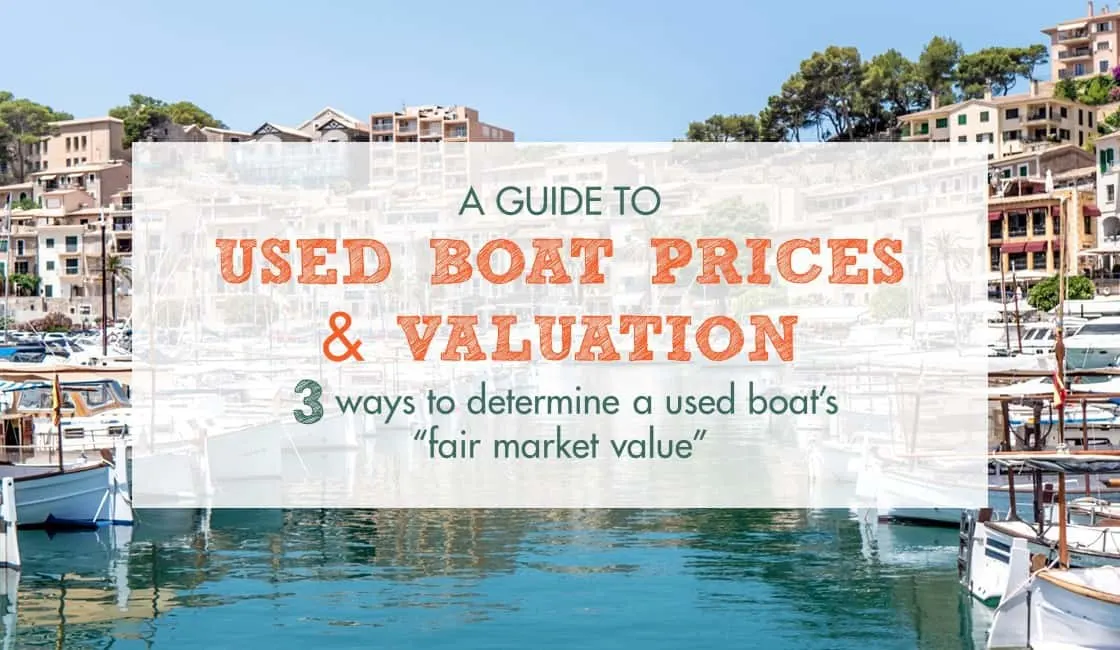
Used boat values and prices shouldn’t be a mystery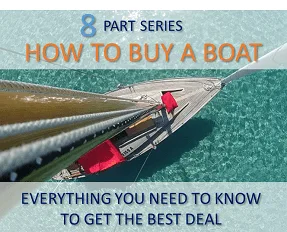
Understanding used boat values should be like understanding car prices, right? Just look up the NADA or Kelley blue book value and you’re on your way.
Unfortunately, it’s not that easy! Why? Because many personal watercraft and boat models aren’t listed in boat value guides.
Table of contents
How do I find the value of my boat?
There are a few different ways to find out what a boat is worth.
- Hire a professional. Pay a surveyor or broker to tell you what your boat is worth
- Use online calculators. If you have a common boat make and model, there are several sites you can use to look up used boat values. These are especially helpful if you’re interested in popular and new models, but less useful for uncommon and old boats.
- Do your own boat value calculation. We’ll show you how to roughly estimate the value of a boat and walk you through an example. Don’t worry, the math is easy and we’ve provided a free downloadable calculator at the end of this post.

Hire a professional: marine surveyors, boat brokers, marine mechanics
While there’s no substitute for doing your own research, sometimes it’s helpful to get a professional opinion. Here are some of the service providers that can help you value a used boat.
Marine surveyors
What does a marine surveyor do?
A marine surveyor will physically inspect the boat and tell you what they think the boat is worth. Usually, this takes place on the dock or in a boatyard and doesn’t include sea trials.
How much should a marine survey cost?
Boat survey cost varies depending on the type of survey being performed. A purchase survey may cost upwards of $18 per foot of boat length, whereas a less detailed insurance condition and valuation survey may cost upwards of $16 per foot.
What is involved in a marine survey?
- Purchase condition and valuation ($18+ per foot). This involves a deep 3-6 hour inspection. The surveyor will ask to see the boat both in the water and out of the water. The final report for purchase surveys will list both a “replacement value” and a “market value” as well as any deficiencies.
- Insurance condition and valuation ($16+ per foot): This survey is less expensive and less detailed. It’s more for boat owners who are looking to insure their boats. Most insurance companies ask owners to submit a recent survey of the vessel. While not as detailed as the previous survey, it will still provide you with a suggested boat market value.

Do I really need to hire a professional marine surveyor?
It comes down to your boat knowledge, the complexity of the boat, and your financial risk tolerance.
If you’re new to boating you’ll want an experienced eye to help you assess the boat for safety and help you figure out a fair price.
If you’re buying something small and simple like a kayak or dinghy, a visual inspection will likely reveal any potential problems.
However, boat systems can be extremely complex on larger vessels and that’s where a professional marine surveyor’s opinion will pay dividends.
Keep in mind, that while a boat survey may seem expensive, it could actually save you money over the course of the sales transaction. A surveyor will be able to spot problems with the boat that you might miss which can help you negotiate a lower purchase price.
Generally speaking, if you’re spending more than $5,000 on a boat, or plan on financing it through a boat loan it’s probably worth having it professionally surveyed.
How do I find a good boat surveyor?
Your best bet is to look for surveyors affiliated with the National Association of Marine Surveyors (NAMS) or the Society of Accredited Marine Surveyors (SAMS). You can search for a surveyor in your area on the NAMS and SAMS websites.
Ask other boaters for a recommendation on a marine surveyor in your area. Some surveyors are more experienced, knowledgeable, and expensive than others.
For example, there is a surveyor in the Pacific Northwest who earned the nickname “Dr. Doom” by being so thorough that he almost always finds problems with a boat.
Interview potential surveyors and ask what type of boat they specialize in. Some will be more familiar with sail, while others may have a specialty like pontoon boats, houseboats, or wooden hulls.

Boat brokers
A boat broker or boat dealer is the equivalent of a realtor in the boating world. They can be very helpful in determining used boat values, not only because brokers have an experienced eye and a sense for the local market, but also because they have access to a very special data set.
Boat dealers who advertise on YachtWorld (which most do) have access to a massive private database that shows the actual selling prices for boats (not just the list prices that regular users see).
Should I use a boat broker to buy a boat?
While boat brokers generally represent the selling party, you can hire one to represent you as a buyer.
If you don’t hire a broker it’s still worth calling their offices to get their thoughts on the value of your boat or a boat you’re interested in. Usually, they’re very friendly and happy to share their knowledge. They may even point you in the direction of a good deal that you’d missed.
How much is a boat broker?
A broker is paid a commission by the seller (usually in the neighborhood of 10% of the selling price).
Marine mechanics
Used boat values are heavily impacted by the condition of a boat’s engine because engines are so expensive to replace. In some situations, a boat might be worth next to nothing if the engine is shot.
While engine hours can be a useful indicator, even a brand-new engine could have lurking issues. For that reason, some potential buyers will hire a marine mechanic to inspect the outboard motor or engine before purchasing a boat.
If you’re concerned about a boat’s engine you can also take a sample of the boat’s fuel and send it off to a fuel lab, they’ll send you a report with valuable information on the condition of the engine.

Check an online boat value calculator
There are a few boat pricing guides that allow you to look up used boat values. These can be helpful for finding average prices on relatively new boats.
- J.D. Power NADA Guides
- BUCValu
- Kelley Blue Book (personal watercraft only)
While online calculators like the NADA boat guide may be able to provide you with a boat book value, they pose a couple of issues:
- Your boat may not be listed. The problem with the NADA boat prices calculator is that the National Automobile Dealers Association (NADA) only has listings for the most popular boat types, makes, and models. If you’re researching a common boat, you might be able to use this to look up prices. However, anything else is unlikely to be listed.
- The listed prices are averages and don’t consider individual deficiencies (or upgrades) specific to a particular boat. Even if you find a used boat price listed in NADA, it doesn’t mean that it’s an accurate price for your particular boat.
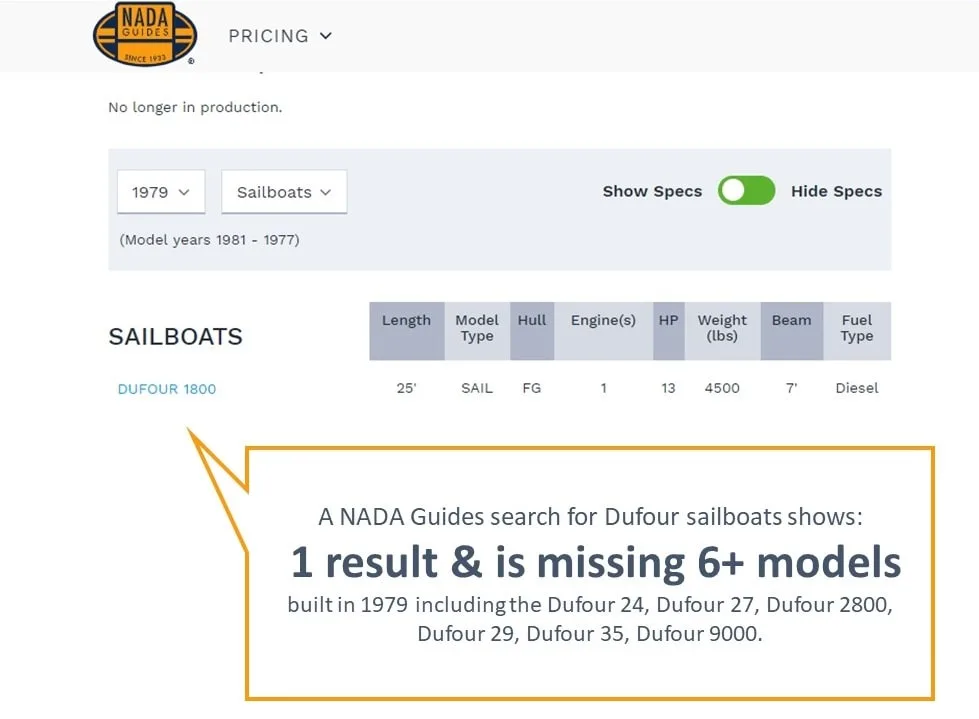
How to estimate a boat’s value (when it’s not listed on NADA Boat values)
Boat value guides like NADA and Kelley Blue Book can offer useful data points. However, it’s important to do your own research.
We’ll share how we estimate a boat’s value but bear in mind that our process may not apply in your situation. Do your research, use your judgment, and seek out a professional opinion (see above).
STEP 1: Evaluate the list price
We always take the listed price with a few grains of salt. From talking to yacht broker friends and from our own experiences, we’ve found that boats often don’t sell for the list price. In fact, most of our first offers have been in the range of 70-80% of the list price.
Craigslist is especially useful for finding cheap boats, we share the secrets for searching out great deals on Craigslist.
If we are interested in a boat, one of the first things we do is ask for a copy of the most recent yacht survey. The survey will tell us a bit about the boat’s history and what the boat was worth at the time of the survey.
Beware of sellers who use 10-year-old survey reports to justify their current asking price!
Example:
I go on Craigslist and find a Dufour 35 sailboat from 1979, listed at $20,000. I contact the seller and ask for the most recent survey. They send me a 15-year-old survey that lists the boat’s value as $45,000.
STEP 2: Do some comparison shopping
We always start by comparing the boat we’re interested in with similar boats, both locally and around the world.
There are dozens of sites you can check, but in general, we find these to be the best places to buy a used boat.
Looking at the sales prices in the local area is a good place to start. We first check out the used boats in our local area by searching yacht brokers, classified ads, Craigslist, and Kijiji within a 500-mile radius.
Next, we search on Yachtworld and Sailboat Listings of the boat’s exact year and model.
There are three important things to consider when comparing used boats
- The condition. Some boats are better maintained than others. A boat in good condition will command a higher price than a boat in poor condition.
- The location. Some boat markets are cheaper than others (e.g., boats cost less in Mexico and more in Australia)
- The year the boat was built. As with cars, expect lower prices for older boats (e.g., a 20-year-old fishing boat should be worth less than one build last year)
If you can’t find more than one or two comparable boats of the same model, you could expand your search to include slightly larger or smaller boats made by the same boat manufacturer. Failing that you could look at similar boat types and sizes made by other boat manufacturers.
Example:
I search for Dufour 35s on Craigslist, Kijiji, Yachtworld, and Sailboat Listings, and here are the results:
STEP 3: Use a price curve to estimate the market value of a used boat over time
In evaluating a particular boat we have as gone as far as making depreciation curves. Don’t worry—it sounds complicated, but it’s not. You can download our free calculator at the bottom of this post.
We collect all the listings for comparable boats in Excel and then plot them on a scatter-plot graph.
For example, if we are looking at a 41’ Beneteau, we search for all Beneteaus in the 40-43’ range. We put the age and price of every boat into an Excel document and plot them on a scatter-plot graph.
Next, we add a trend line (usually polynomial, order 2) to fit the data. This will give us an idea of what the price of the boat is doing over time and we can project where the price will be going in the next few years.
If we were planning to sell in a few years we would want to keep the boat resale values in mind and choose a year near the beginning of a low slope segment of the trend line.
Sometimes the trend line is skewed by overly-idealistic sellers or junk boats, which we consider outliers and often strike from the data.
Example:
I plug the prices I find into the Calculator (download yours for FREE at the end of this post) and I get the following trend line. The more data points (comparable boats) you add to the Excel sheet the better your estimate will be! Having only five data points is not great, but it’s all I could find for a Dufour 35. Based on this curve line I should assume that a 1979 Dufour 35 (the boat I’m thinking of buying) is worth ~ $29,000.
STEP 4: Estimate what it will cost to get the boat to “fair” condition
When we go to inspect a boat, we write down any projects and repairs that will need to be done (see our boat inspection checklist).
Our goal is to list all the boat systems that need work and any parts that should be repaired or replaced. If you’re not experienced with boat systems and mechanics, hire a professional or bring a friend who is.
Next, we assign a material and labor cost to each project.
In general, we don’t add normal maintenance costs because that would skew the value and be unfair to the seller. The exception is if the seller hasn’t been maintaining the boat and we would be playing catch up.
We add all of the repair costs to the list price for a total (which is usually depressingly high). We often multiply the repair costs by 1.25 as we’ve found we are usually optimistic about price and time.
It’s also a good idea to ask the owner what they’ll be taking off the boat. Sometimes owners will want to exclude electronics or outboard motors from the sale, which can amount to a fair chunk of change.
Example:
Upon inspecting the Dufour 35 I discover there is some work to be done! The GPS doesn’t work ($1,000 replacement cost), the mainsail is wrecked beyond repair ( $2,000 replacement cost) and the furler needs to be replaced ($3,000). I’ll have to spend at least $6,000 fixing up the boat, which I multiply by a factor of 1.25 (because there will likely be additional fixes!). So, I estimate it will be $7,500 to get the boat into “fair” condition.
STEP 5: Putting it all together
When you combine the list price and the cost of repairs you’ll be left with the actual price of the boat. Compare this to the comparable estimated price (Step 2) and you’ll have a sense of whether the boat is priced too high, too low, or just right!
If it’s in the right price range, it’s a good time to start thinking about transportation, taxation, and financing costs. You can often score a great deal if you search farther afield but you have to factor in any moving costs and taxes. Ask yourself:
- Will you have to ship the boat?
- Does the price include a boat trailer?
- Will you pay taxes or duties?
- Will you need to finance your boat? If so, have you looked into boat loans?
If you’re thinking of buying abroad, you might want to learn about sailboat arbitrage —the art of buying and selling boats in the right markets. Some people have even managed to sail around the world for free by buying and selling their boats in the right geographies.
Example:
When I take the list price ($20,000) and add the repair costs ($7,500) I realize the boat will cost me $27,500 in total. When I compare that to my comparable estimated price of $29,000, I can see that this boat is in the right ballpark and probably fairly priced.
A COUPLE OF ADDITIONAL THINGS TO CONSIDER
Emotional pricing
Sometimes owners put so much money and hard work into a boat that they value the boat higher than the market does. It takes time and a few offers to wear down the emotional seller to a more rational price point.
Sometimes, the seller sets an idealistic price and won’t budge because they don’t really want to sell. We have encountered this a few times and we move on to the next boat.
Emotional buying
The corollary to emotional pricing is emotional buying.
Sometimes we fall in love with a boat; something about the interior layout or the lines or the color of the hull, even the name can have a profound influence.
We can’t help but let our emotions into the decision-making process, but we have found that they should be reserved for the final decision. To minimize our emotions, we try to quantify everything in terms of numbers and put it in an Excel sheet.
A final note: Determining used boat values is more art than science. Take all of this with a grain of salt and USE YOUR JUDGMENT! The calculator and recommendations above are in no way meant to be a substitute for professional advice.
As Publilius Syrus wrote: “Something is only worth what someone is willing to pay for it”. Good luck and happy boat buying!
Ready to make an offer? Make sure you read about making an offer on a boat and how to get the best price without losing the deal.
Download your FREE Boat Pricing Calculator

Robin was born and raised in the Canadian North. His first memory of travel on water was by dogsled across a frozen lake. After studying environmental science and engineering he moved to Vancouver aboard a 35’ sailboat with his partner, Fiona, with the idea to fix up the boat and sail around the world. He has written for several sailing publications including SAIL, Cruising World, and was previously a contributing editor at Good Old Boat.

